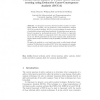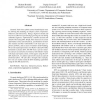76 search results - page 3 / 16 » Formal Fault Tree Analysis of State Transition Systems |
EDCC
2005
Springer
14 years 1 months ago
2005
Springer
Abstract. In this paper we present the formal safety analysis of a radiobased railroad crossing. We use deductive cause-consequence analysis (DCCA) as analysis method. DCCA is a no...
FTRTFT
2000
Springer
13 years 11 months ago
2000
Springer
Formal methods can improve the development of systems with high quality requirements, since they usually o er a precise, nonambiguous speci cation language and allow rigorous veri ...
HASE
1998
IEEE
13 years 11 months ago
1998
IEEE
Engineers use software tools to analyze designs for critical systems. Because important decisions are based on tool results, tools must provide valid modeling constructs; engineer...
FMICS
2007
Springer
14 years 1 months ago
2007
Springer
Abstract. In this paper we present an action/state-based logical framework for the analysis and verification of complex systems, which relies on the definition of doubly labelled...
DSN
2007
IEEE
14 years 1 months ago
2007
IEEE
Dynamic Fault Trees (DFT) extend standard fault trees by allowing the modeling of complex system components’ behaviors and interactions. Being a high level model and easy to use...


